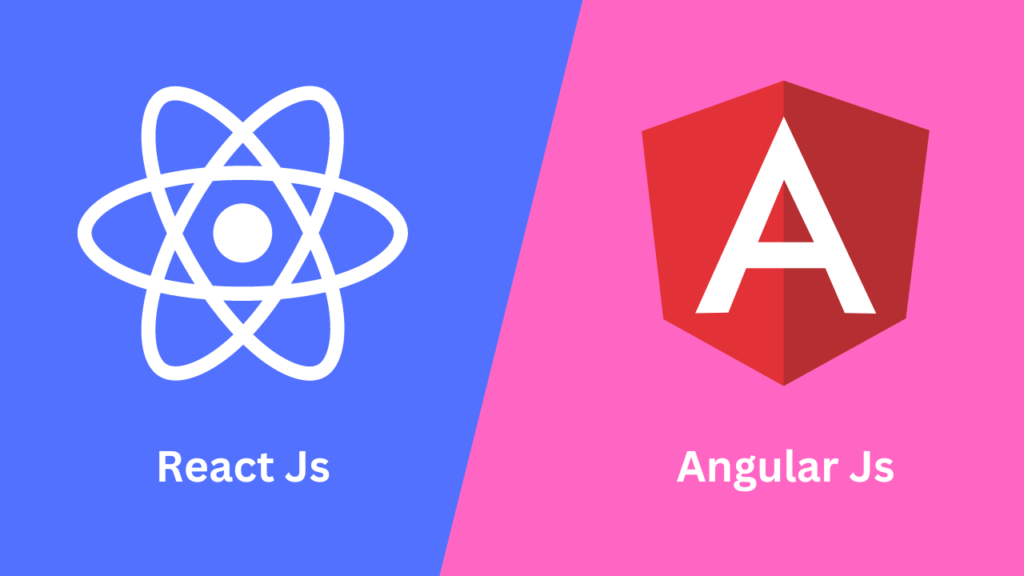React JS vs Angular JS: A Comparative Analysis

React JS and Angular JS are JavaScript frameworks commonly used to develop interactive and dynamic web applications. Both approaches have benefits and limitations, making them appropriate for specific applications. In this article, the writer intends to compare and contrast React JS and Angular JS, including the features, pros, and cons.
React JS
React JS, which is developed by Facebook, is a JavaScript library that uses components to create user interfaces. It comes with a declarative paradigm where the developers describe the kind of UI they want, and React takes care of rendering and updating.
Key features of React JS include
- Component-based architecture: It is important to notice that React applications are developed based on reusable components thus enhancing modularity and code reuse.
- JSX: JSX is an advancement of JavaScript syntax which makes it simpler to write HTML-like structures in JavaScript which makes it more readable.
- Virtual DOM: React employs a light version of the actual DOM known as the virtual DOM through which it updates the UI by painting the changes.
- Unidirectional data flow: React employs unidirectional data flow and this makes it easy to reason about and control the state of the application.
Benefits of React JS
- Performance: React’s conventional DOM and successful rendering procedure play a pivotal role in the enhancement of performance.
- Flexibility: Building the complex UI in React is facilitated by the architecture that is based on components and the declarative approach.
- Large community: React has a very large and vibrant community and this is the place where one can find a lot of information, libraries, and support.
- Easy to learn: Because of the simple concepts and clear syntax, learning React is quite easy for programmers who already have some experience with JavaScript.
Drawbacks of React JS
- Opinionated: The flexibility that comes with the use of React is that it does not dictate how things should be done like Angular does, meaning that more architectural decisions have to be made.
- Steeper learning curve: These basic concepts may not be so difficult, but we have to admit that to master the advanced features and follow best practices it may take some time.
Angular JS
Angular JS is an extensive JavaScript-based framework for creating powerful web applications and was developed by Google. It is a complete solution that includes many capabilities and facilities, which are necessary for the development of complex applications.
Key features of Angular JS include
- Two-way data binding: The technology automatically synchronizes the Browser User Interface with the model data and vice versa making the job easier.
- Dependency injection: Angular JS has its own dependency injection mechanism that can help one with managing the dependencies, as well as testability issues.
- MVC architecture: The MVW (Model-View-Whatever) design pattern is followed by Angular JS which segregation increases code manageability.
- Directives: Angular JS also enables developers to use their own tags and attributes to enhance the functionality offered by the HTML.
Benefits of Angular JS
- Comprehensive framework: Angular JS is equipped with many features, and it provides numerous tools and services that are needed when working on complex projects.
- Two-way data binding: Two-way data binding makes the development process easier and enhances the user interface.
- Strong community: Angular JS enjoys a huge community and therefore has all the necessary resources and support for developers.
Drawbacks of Angular JS
- Steeper learning curve: Angular JS is more complex to use in comparison with React if a programmer does not have much experience in the framework.
- Performance: Angular JS has a two-way data binding which may affect the performance of an application especially if it is large.
- Opinionated: Angular JS is a more opinionated framework where the framework has a more imposed view on the application.
Choosing the Right Framework
Some of the considerations that make it hard to determine between React JS and Angular JS are the needs of a project, the kind of team working on it, and one’s preference.
- Project size and complexity: For comparatively less complex projects, React JS may be enough due to its ease and modularity. However, for larger and more complex applications, Angular JS has many features and tools that may prove beneficial.
- Team expertise: If your team has prior experience with the Angular JS, then this is advisable to continue working with it as a team. Still, it allows your team to get the feeling of working with React JS if your team is more used to it.
- Personal preferences: Finally, it also involves personal preference and coding standards that one prefers to use. Some developers will agree that React JS is easier to manage due to its focus on the declarative paradigm and component-oriented design, whereas some will appreciate things such as the two-way binding or dependency injections in Angular JS.
Conclusion
Thus, React JS as well as Angular JS can be regarded as effective tools for the development of Web applications. It is therefore advisable to weigh down your needs and preferences to find out which among these choices is the best for your project.
Thanks for reading this article React Js vs Angular Js by Sparkify Solutions.